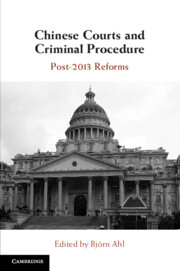Book contents
- Chinese Courts and Criminal Procedure
- Chinese Courts and Criminal Procedure
- Copyright page
- Contents
- Figures and Tables
- Contributors
- Acknowledgements
- Abbreviations
- 1 Post-2013 Reforms of the Chinese Courts and Criminal Procedure
- 2 The Meandering Path of Judicial Reform with Chinese Characteristics
- 3 Dimensions and Contradictions of Judicial Reforms in China
- 4 How the Supreme People’s Court Drafts Criminal Procedure Judicial Interpretations
- 5 Judicial (Dis)Empowerment and Centralisation Efforts
- 6 A New Model of Habeas Corpus in China? Procuratorial Necessity Examination of Pretrial Custody
- 7 Live Witness Testimony in the Chinese Criminal Courts
- 8 Blood Money and Negotiated Justice in China
- 9 Performance Evaluation in the Context of Criminal Justice Reform
- 10 From Populism to Professionalism
- Index
1 - Post-2013 Reforms of the Chinese Courts and Criminal Procedure
An Introduction
Published online by Cambridge University Press: 25 June 2021
- Chinese Courts and Criminal Procedure
- Chinese Courts and Criminal Procedure
- Copyright page
- Contents
- Figures and Tables
- Contributors
- Acknowledgements
- Abbreviations
- 1 Post-2013 Reforms of the Chinese Courts and Criminal Procedure
- 2 The Meandering Path of Judicial Reform with Chinese Characteristics
- 3 Dimensions and Contradictions of Judicial Reforms in China
- 4 How the Supreme People’s Court Drafts Criminal Procedure Judicial Interpretations
- 5 Judicial (Dis)Empowerment and Centralisation Efforts
- 6 A New Model of Habeas Corpus in China? Procuratorial Necessity Examination of Pretrial Custody
- 7 Live Witness Testimony in the Chinese Criminal Courts
- 8 Blood Money and Negotiated Justice in China
- 9 Performance Evaluation in the Context of Criminal Justice Reform
- 10 From Populism to Professionalism
- Index
Summary
The introduction mirrors the volume’s overall structure. It begins with a review of the literature on post-2013 legal institutional reforms before turning to the context and content of procedural law changes and court reforms. The chapter then discusses the role of the Supreme People’s Court as an initiator of criminal procedure amendments and promoter of legal institutional reform. The most significant change in the judicial structure, which is caused by the introduction of the supervision commissions, is examined from the perspective of ongoing court reforms and the balance of power amongst the various actors within the judiciary. The introduction then turns to the criminal procedure law reforms enacted in 2012 and 2018, discussing the new mechanism of pretrial detention, the criminal justice reform goal of ‘trial-centredness’ and criminal reconciliation in public prosecution cases. As the contextual factors of criminal trials often have a decisive impact on the trial outcome, such factors as performance evaluations of courts and judges and media scrutiny of criminal cases are subsequently analysed. It concludes with a summary of the key issues and findings of the volume as a whole.
- Type
- Chapter
- Information
- Chinese Courts and Criminal ProcedurePost-2013 Reforms, pp. 1 - 28Publisher: Cambridge University PressPrint publication year: 2021



